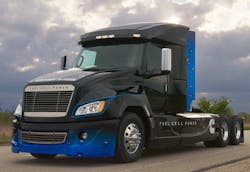DOE funding nearly $200 million for R&D to reduce heavy truck emissions, expand EV charging
The U.S. Department of Energy has awarded approximately $199 million to fund 25 projects focused on cleaner car and truck emissions and electric vehicle charging infrastructure.
The DOE’s aim includes long-haul trucks powered by batteries and fuel cells (such as the Cummins model, pictured) as well as improving EV charging infrastructure. Transportation currently generates almost one-third of the nation’s carbon emissions, more than any other sector.
“As America’s solutions department, DOE is working with manufacturers and industry partners to reimagine vehicle transportation across the country to achieve our climate goals—from lowering carbon emissions to increasing efficiency and affordability,” said Energy Secretary Jennifer Granholm said. “This investment and the innovations that come from it will help shape our clean energy future and strengthen domestic manufacturing that support good-paying careers for hardworking Americans.”
The SuperTruck 3 program is an extension of the DOE’s Office of Energy Efficiency and Renewable Energy initiative created 12 years ago to improve heavy-duty truck freight efficiency by 50 percent.
The SuperTruck 3 round will fund five heavy vehicles manufacturers with a combined $127 million to pioneer electrified medium- and heavy-duty trucks and freight system concepts to achieve higher efficiency and zero emissions. Projects will be funded over five years, subject to appropriations, and recipients will match federal funding, dollar-for-dollar:
- PACCAR Inc (Bellevue, WA) will develop eighteen Class-8 battery electric and fuel cell vehicles with advanced batteries and a megawatt charging station will also be developed and demonstrated. (Award amount: $32,971,041)
- Volvo Group North America, LLC (Greensboro, NC) will develop a 400-mile-range Class-8 battery electric tractor-trailer with advanced aerodynamics, electric braking, EV optimized tires, automation and route planning. A megawatt charging station will be developed and demonstrated. (Award amount: $18,070,333)
- Daimler Trucks North America, LLC (Portland, OR) will develop and demonstrate two 2 Class-8 fuel cell trucks with 600-mile range, 25,000-hour durability, equivalent payload capacity and range to diesel. (Award amount: $25,791,669)
- Ford Motor Company (Dearborn, MI) will develop and demonstrate five hydrogen fuel cell electric Class-6 Super Duty trucks targeting cost, payload, towing, and refueling times that are equivalent to conventional gasoline trucks. (Award amount: $24,952,314)
- General Motors, LLC (Pontiac, MI) will develop and demonstrate four hydrogen fuel cell and four battery electric Class 4-6 trucks. The project will also focus on development of clean hydrogen via electrolysis and clean power for fast charging. (Award amount: $26,061,726)
Separately, the DOE also released the Low Greenhouse Gas (GHG) funding opportunity that will invest $71 million in 20 research, development, and demonstration projects with industry, academia, and non-profits including Clean Cities Coalitions for the creation of solutions to reducing emissions for on- and off-road vehicles and accelerating the expansion of EV infrastructure and charging.
Projects will work to lower emissions by leading the expansion of EV charging stations to facilitate the transition from fossil fuel-powered vehicles to electric vehicles. This includes EV charging community projects, such as installing charge stations within multi-unit housing, hosting community-led demonstrations that address barriers to EV adoption and lowering costs for direct current (DC) fast charging equipment.
(Rod Walton is senior editor for EnergyTech. He can be reached at [email protected]).
About the Author
EnergyTech Staff
Rod Walton is head of content for EnergyTech.com. He has spent 17 years covering the energy industry as a newspaper and trade journalist.
Walton formerly was energy writer and business editor at the Tulsa World. Later, he spent six years covering the electricity power sector for Pennwell and Clarion Events. He joined Endeavor and EnergyTech in November 2021.
He can be reached at [email protected].
EnergyTech is focused on the mission critical and large-scale energy users and their sustainability and resiliency goals. These include the commercial and industrial sectors, as well as the military, universities, data centers and microgrids.
Many large-scale energy users such as Fortune 500 companies, and mission-critical users such as military bases, universities, healthcare facilities, public safety and data centers, shifting their energy priorities to reach net-zero carbon goals within the coming decades. These include plans for renewable energy power purchase agreements, but also on-site resiliency projects such as microgrids, combined heat and power, rooftop solar, energy storage, digitalization and building efficiency upgrades.
